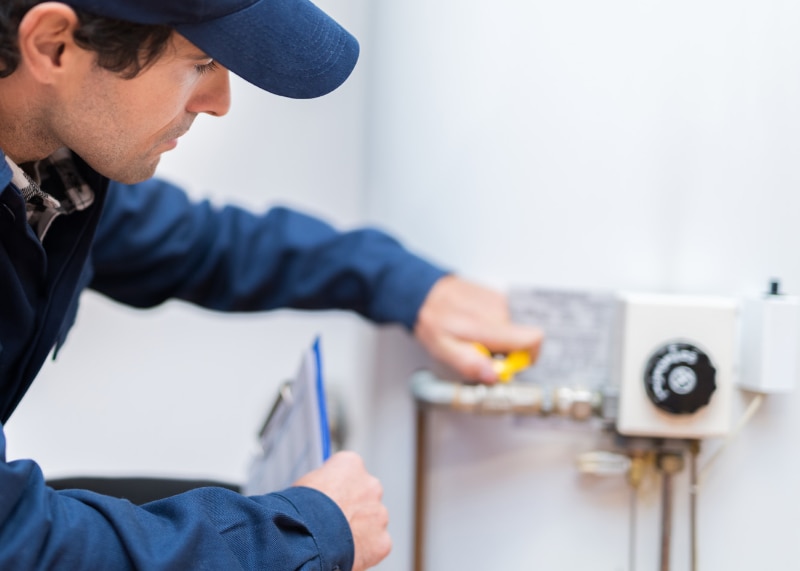Handling Regular Heater Issues
Handling Regular Heater Issues
Blog Article
We've uncovered this post on Water Heater Repair and Troubleshooting down the page on the internet and reckoned it made good sense to write about it with you on my blog.

Think of beginning your day without your regular hot shower. That already establishes a bad tone for the rest of your day.
Every home requires a reputable hot water heater, but just a couple of understand how to take care of one. One simple means to keep your hot water heater in top form is to check for mistakes on a regular basis and repair them as soon as they appear.
Bear in mind to turn off your water heater before smelling around for faults. These are the hot water heater mistakes you are most likely to come across.
Water also hot or as well cold
Every water heater has a thermostat that figures out exactly how hot the water gets. If the water coming into your home is as well hot regardless of establishing a convenient optimum temperature level, your thermostat might be faulty.
On the other hand, also cold water may result from a stopped working thermostat, a broken circuit, or incorrect gas circulation. For instance, if you use a gas hot water heater with a broken pilot burner, you would obtain cold water, even if the thermostat is in best problem. For electric heating units, a blown fuse may be the offender.
Not nearly enough hot water
Hot water heater been available in many sizes, depending upon your warm water demands. If you run out of hot water before everybody has actually had a bathroom, your water heater is too little for your family size. You need to consider installing a larger water heater storage tank or selecting a tankless hot water heater, which occupies much less room and is extra resilient.
Odd sounds
There are at least five kinds of sounds you can learn through a water heater, but the most typical analysis is that it's time for the hot water heater to retire.
First of all, you must know with the regular appears a hot water heater makes. An electrical heating system might seem different from a gas-powered one.
Popping or banging sounds generally suggest there is a piece of debris in your storage tanks, and it's time to cleanse it out. On the other hand, whistling or hissing audios may simply be your shutoffs allowing some pressure off.
Water leaks
Leaks can come from pipes, water links, valves, or in the worst-case circumstance, the storage tank itself. Over time, water will certainly corrode the container, and also discover its escape. If this occurs, you require to replace your hot water heater immediately.
Nonetheless, before your modification your entire storage tank, make sure that all pipelines are in area which each shutoff works completely. If you still require aid recognizing a leakage, call your plumber.
Rust-colored water
Rust-colored water means one of your water heater elements is rusted. Maybe the anode pole, or the container itself. Your plumber will certainly have the ability to recognize which it is.
Warm water
Despite just how high you established the thermostat, you will not obtain any type of hot water out of a heating unit well past its prime. A hot water heater's performance might minimize with time.
You will also obtain warm water if your pipelines have a cross connection. This means that when you activate a faucet, hot water from the heater moves in along with normal, cold water. A cross connection is very easy to area. If your hot water taps still follow shutting the hot water heater valves, you have a cross link.
Discoloured Water
Rust is a significant reason for filthy or discoloured water. Corrosion within the water storage tank or a failing anode pole could trigger this discolouration. The anode pole safeguards the container from rusting on the inside and also should be examined yearly. Without a rod or a properly working anode rod, the hot water promptly wears away inside the tank. Get in touch with a specialist hot water heater specialist to establish if changing the anode pole will certainly fix the problem; if not, replace your water heater.
Final thought
Preferably, your hot water heater can last one decade prior to you require an adjustment. Nonetheless, after the 10-year mark, you may experience any of these faults more frequently. At this moment, you ought to add a new hot water heater to your spending plan.
How To Troubleshoot 3 Common Water Heater Problems in Twin Cities
The Water Heater Is Leaking
A leaky cold water inlet valve A loose pipe fitting A leaky temperature and pressure relief valve A corroded anode rod A cracked tank Turn Off Your Water Heater:
Shut off your gas water heater by turning the gas valve on the unit to the “OFF” position. Shut off your electric water by switching its power off at your electrical panel. Look for a two-pole breaker labeled “water heater” and turn it to the “OFF” position. Move the ball valve connected to the water heater to be perpendicular to the piping at a 90° angle. Look for the Leak:
Depending on whether the water is coming from the tank's top or bottom, you’ll want to look for the leak in different locations.
If the leak comes from the top of the tank, carefully look for water escaping from the cold water inlet valve or loose pipe fittings. Rusted hot and cold water valves can have loose connections with the tank, with water leaking out of them.
https://mspplumbingheatingair.com/blog/how-to-troubleshoot-3-common-water-heater-problems
I stumbled upon that blog posting about Water Heaters Problems while doing a search on the internet. Be sure to set aside a second to promote this page if you enjoyed it. I cherish reading our article about Common Problems with Tank Water Heaters.
Top plumbers, one call. Report this page